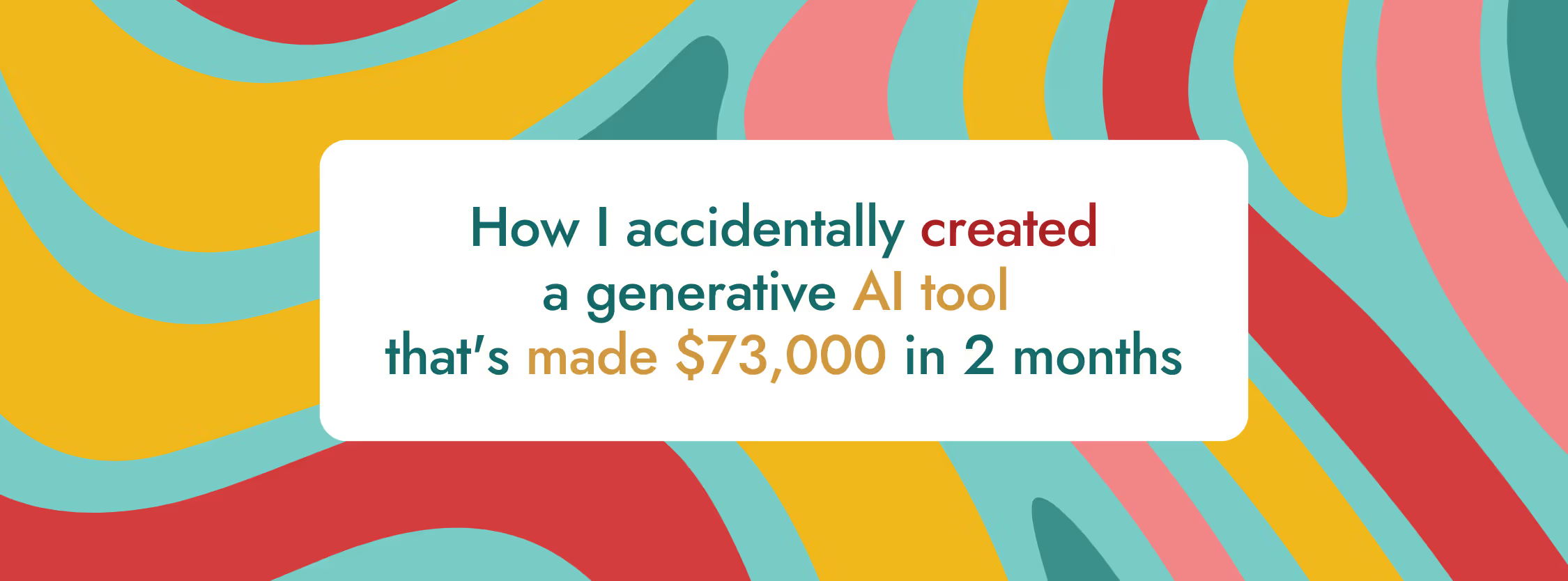Meet Louis. He's the founder of AudioPen, an AI tool to convert messy thoughts into clear text.
AudioPen launched on Product Hunt several days ago and ended up as #1, with more than 1,000 upvotes.
Since then, many people have tweeted about AudioPen. (Just look at Louis' Twitter account, where he retweets those mentions.)
All of this helped AudioPen quickly amass more than 1,000 paying users and $73,000 in revenue in its first two months.
Without further ado, here's the interview with Louis:
What's your name, and what are you working on?
I'm Louis Pereira, a part-time Indie Hacker. I've built a bunch of web apps, the latest of which is AudioPen. It's an AI-powered voice note app that listens to you talk, and then rewrites what you said in clear, logically flowing words. It's the easiest way to go from messy thought to clear text.
What inspired you to create AudioPen?
AudioPen was an accidental invention.
I was just playing around, learning how to use OpenAI's APIs. In the process, I built a barebones version of AudioPen as a tiny tool on my personal website. It was one among three other tiny tools I'd built that week.
The idea was simple, a voice recorder that listened to what you said, and then transcribed and summarized it in words that were easy to read and ready to share.
To my surprise (and luck), people seemed to really like AudioPen.
So I decided to build it as a standalone tool.
At what point did you decide to devote more time to AudioPen vs. getting back to your job?
During the day, I work a full time job with my family business, which operates in the offline world. Since AudioPen has taken off, I've sacrificed sleep.
Occasionally when things break, or in case I'm in the zone while building new features, I take the day off from my day job. Lucky for me, my family is pretty supportive.
How did you validate that there's a need for AudioPen?
I'd been building a bunch of tiny tools on my personal website and tweeting about each one.
AudioPen stood out though. It got the most attention and positive feedback. So I decided to double down on it.
A few days after I built the mini version, I was hosting an event called Half Day Build. It's a free hackathon that I organize every couple of months, where indie builders get together to attempt to go from idea to revenue in under 12 hours. I decided to build the full version of AudioPen during that month's Half Day Build.
When the product was almost ready, I invited a few people to test it before I released it publicly. To my surprise, they didn't just test it, they even paid for the premium version before I'd even released the product to the public. That's when I figured I was on to something.
When did you start seeing traction?
AudioPen began generating revenue right from the start. However, it was followed by about a week of steady, slow sales. Nothing exciting.
Then one day I got a DM from a Twitter account with almost 200,000 followers asking me about the tool. That account then wrote a thread about it, and things took off. They haven't slowed down since.
How did you spread the word for AudioPen in order to get more users?
I have just been building in public since day 1. Mostly on Twitter. I share my thought process around building new features on the product. I share stuff I've learned. I share small wins. I share progress I'm making.
I've also taken every opportunity to appear on a podcast or a newsletter that's come my way. As an indie (part-time) builder with no marketing team or budget, I'm hustling as hard as I can.
Other than this, I started an affiliate program for AudioPen, but that is still in its infancy. I'm hoping to get more traction on that front soon.
I've also been extremely fortunate that some of the app's early users are extremely kind. They've been going around spreading the word about AudioPen by themselves.
Was AudioPen the first successful AI project? Did you have any (un)successful attempts in building an API product?
Yes, AudioPen was the first large success I've had with an AI project. I also built another tool that uses AI called Tiny Testimonial. It's a testimonial collection tool that makes it really easy for people to write testimonials. I wouldn't say that its been unsuccessful, but it hasn't exactly been successful either. It's just sitting in some sort of middle ground.
How is AudioPen doing now in terms of revenue/paying users?
Currently, AudioPen has over 11,000 registered users, with over 1,000 paying users at varying price points.
You can learn more about Louis and his progress with AudioPen on his Twitter profile.







.svg)